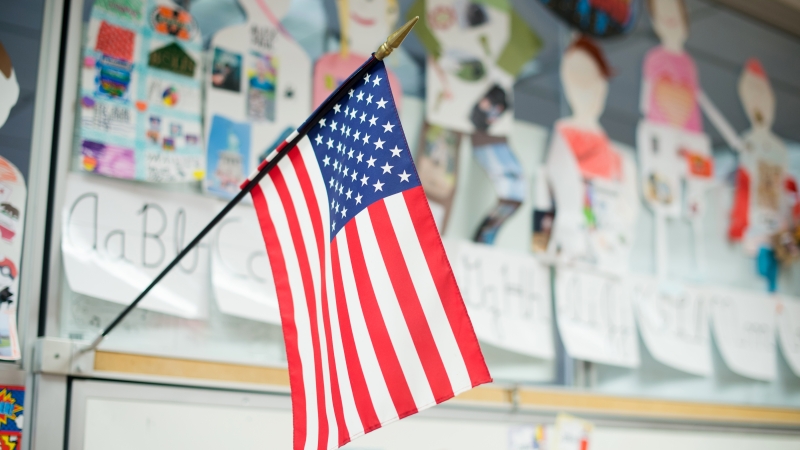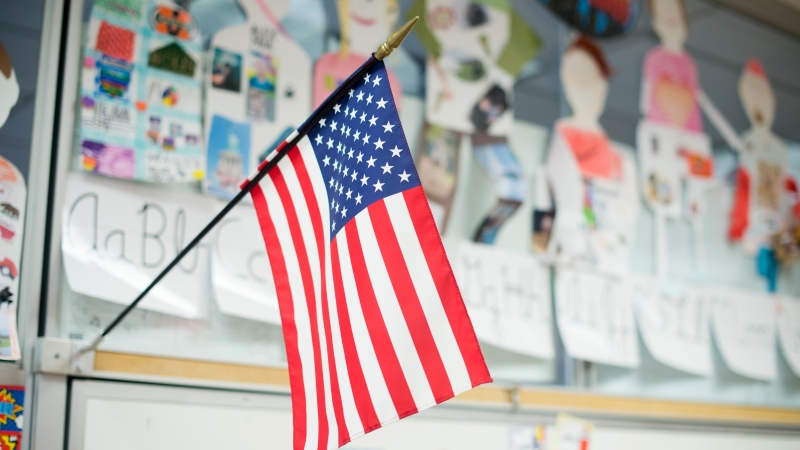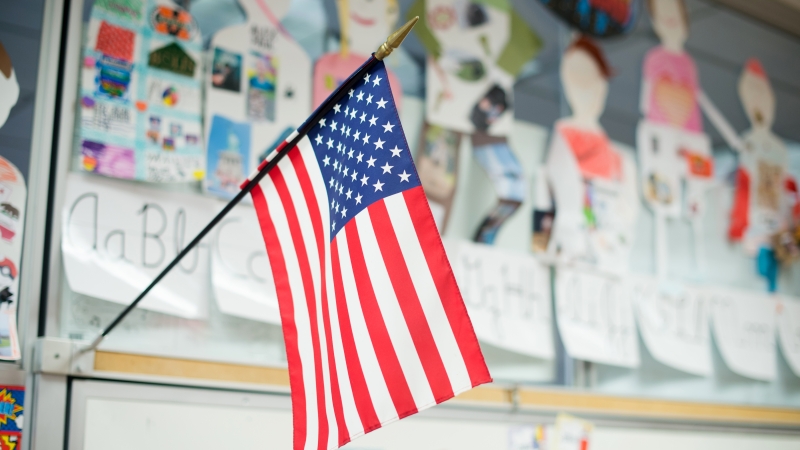
Legislative Context for Dyslexia
The national and state legislative activity that governs and guides the work of Fairfax County Public Schools in serving the needs of students with dyslexia.
Legislation to provide guidance about identifying and supporting students with dyslexia has been passed by both the U.S. Congress and the majority of state legislatures across the United States of America, including the Virginia General Assembly. Below is a summary of the legislative activity that provides a context for the guidance FCPS has developed in this handbook.
| TOPIC | FEDERAL | VIRGINIA STATE |
|---|---|---|
| Dyslexia Awareness | Bipartisan Congressional Dyslexia Caucus October is Dyslexia Awareness Month | Dyslexia definition added to Regulations Governing Special Education Programs for Children with Disabilities in Virginia (effective March 27, 2002) |
| Dyslexia Guidance for Educators | US Department of Education, Office of Civil Rights Dear Colleague Letter, dated October 23, 2015: Dyslexia Guidance | n/a |
| Dyslexia Research Funding | Research, Excellence and Advancements for Dyslexia (READ) Act | n/a |
| Dyslexia Screening | n/a | Senate Joint Resolution No. 87 Ordering VDOE to Conduct a Dyslexia Screening Study, (March 9, 2010) |
| Dyslexia Training | n/a | Va. Code § 22. 1-294 enacted to require that university teacher training programs include information on the identification of dyslexia (effective July 1, 2017) Va. Code § 22. 1-298 amended to require dyslexia training for teacher licensure (effective July 1, 2017) |
| Dyslexia Advisor | n/a | Va. Code § 22. 1-253. 13:2 amended to require school boards to employ a reading specialist with expertise in dyslexia (effective July 1, 2017) |
| Virginia Literacy Act | n/a | Va. Code § 22.1-253.13:2 amended to improve literacy outcomes for Virginia’s learners by requiring:
(signed April, 11, 2022; effective beginning 2024-2025 school year) |
FEDERAL LEGISLATION
May 2012-present: Bipartisan Congressional Dyslexia Caucus
Formed by bipartisan co-chairs Bill Cassidy (R-La.) and Pete Stark (D-Calif.) “to educate other Members of Congress and advance policies to break down barriers faced by dyslexics.” In 2013, Stark was replaced by Julia Brownley (D-Calif.) and in 2015, Bill Cassidy was replaced by Lamar Smith (R-Texas).
See “Dyslexia Resources” for a link to the Bipartisan Congressional Dyslexia Caucus.
October 2015-present: October is Dyslexia Awareness Month
U.S. Secretary of Education Arne Duncan issued a statement on Learning Disabilities, Dyslexia, and Attention Deficit Hyperactivity Disorder Awareness Month. This statement is excerpted below:
October 2015: U.S. Department of Education, Dear Colleague Letter on Dyslexia Guidance
- The U.S. Department of Education issued a “Dear Colleague” letter on October 23, 2015 clarifying the responsibilities of educators in providing services to students with dyslexia, dyscalculia, and dysgraphia under the Individuals with Disabilities Education Act (IDEA).
- The purpose of the letter is to clarify that “there is nothing in the IDEA that would prohibit the use of the terms dyslexia, dyscalculia, and dysgraphia in the IDEA evaluation, eligibility determinations, or IEP documents.”
February 2016: President signs HR 3033 Research Excellence and Advancements for Dyslexia (READ)Act.
- Requires the President’s annual budget request to Congress each year include a line item for the Research in Disabilities Education program of the National Science Foundation and to require the National Science Foundation to conduct research on dyslexia.
- Specifies that the National Science Foundation shall devote no less than $5,000,000 to research into specific learning disabilities, which shall include no less than $2,500,000 for research on the science of dyslexia, for each of fiscal years 2017 through 2021, subject to the availability of appropriations.
VIRGINIA STATE LEGISLATION
March 2002: VDOE revises The Regulations Governing Special Education Programs for Children with Disabilities in Virginia, at 8VAC20-81-10 (effective March 27, 2002), to include the definition of dyslexia as follows:
- Dyslexia is distinguished from other learning disabilities due to its weakness occurring at the phonological level. Dyslexia is a specific learning disability that is neurobiological in origin. It is characterized by difficulties with accurate and/or fluent word recognition and by poor spelling and decoding abilities. These difficulties typically result from a deficit in the phonological component of language that is often unexpected in relation to other cognitive abilities and the provision of effective classroom instruction. Secondary consequences may include problems in reading comprehension and reduced reading experience that can impede growth of vocabulary and background knowledge.
March 2010: The Virginia General Assembly passes SJR No. 87 requiring the Virginia Department of Education to study dyslexia screening for kindergarteners.
- The study found that “no reliable and valid screening instrument for dyslexia has been identified. The International Dyslexia Association’s (IDA) fact sheet supports and encourages schools to begin screening children in kindergarten to identify any child, who exhibits the early signs of reading difficulties, but they also acknowledge that individualized, in‐depth, formal testing of reading, language, and writing skills is the only way to confirm a diagnosis of suspected dyslexia.”
April 2016: The Virginia General Assembly passes HB 842, amending Va. Code § 22. 1-298. 1.D.8 to require dyslexia awareness for teacher licensure, and adding Va. Code § 22. 1-294, to require that university-level teacher training programs include information on the identification of dyslexia, both effective July 1, 2017.
- Requires Board of Education regulations governing teacher licensure to require every person seeking initial licensure or renewal of a license to complete awareness training, provided by the Department of Education, on the indicators of dyslexia and the evidence-based interventions and accommodations for dyslexia.
- Requires VDOE to collaborate with the State Council of Higher Education for Virginia to ensure that all teacher preparation programs offered at public institutions of higher education in the Commonwealth or otherwise available convey information on the identification of students at risk for learning disabilities, including dyslexia, other language-based learning disabilities, and attention deficit disorder.
January 2016: The Virginia General Assembly passes SB 1516, amending Va. Code § 22. 1-253. 13:2.G., to require any school board who employs a reading specialist to employ at least one reading specialist with expertise in dyslexia, effective July 1, 2017.
- Requires one reading specialist employed by each local school board that employs a reading specialist to have training in the identification of and the appropriate interventions, accommodations, and teaching techniques for students with dyslexia or a related disorder and to have an understanding of the definition of dyslexia and a working knowledge of several topics relating to dyslexia.
April 2022: The Virginia General Assembly passes SB616 - The Virginia Literacy Act, amending Va. Code § 22. 1-253. 13:2.G., to require beginning the 2024-2025 school year:
Teacher Preparation Programs:
- Each education preparation program offered by a public or private institution of higher education or alternative certification program that provides training for any individual seeking initial licensure with an endorsement in a certain area, including as a reading specialist, to demonstrate mastery of science-based reading research and evidence-based literacy instruction, as such terms are defined in the bill;
- The literacy assessment required of individuals seeking initial teacher licensure with endorsements in certain areas to include a rigorous test of science-based reading research and evidence-based literacy instruction.
Local School Boards:
- To establish a division wide literacy plan;
- To employ one reading specialist for each 550 students in kindergarten through grade three; and
- To provide a program of literacy instruction whereby:
- The program provides reading intervention services to students in kindergarten through grade three who demonstrate deficiencies based on their individual performance on the Standards of Learning reading assessment or an early literacy screener provided or approved by the Department of Education;
- A reading specialist, in collaboration with the teacher of any student who receives such reading intervention services, develops, oversees implementation of, and monitors student progress on a student reading plan; and
- Each student who receives such reading intervention services is assessed utilizing either the early literacy screener provided or approved by the Department or the grade-level reading Standards of Learning assessment again at the end of that school year.
See the section entitled, “Dyslexia Resources” for a link to Virginia’s Legislative Information System.
© 2017 Fairfax County School Board. All rights reserved. This material may not be reproduced, displayed, modified or distributed without the express prior written permission of the copyright holder. For permission, contact the FCPS Department of Special Services, Office of Special Education Instruction, Willow Oaks Corporate Center, 8270 Willow Oaks Corporate Drive, Fairfax, VA 22031.




